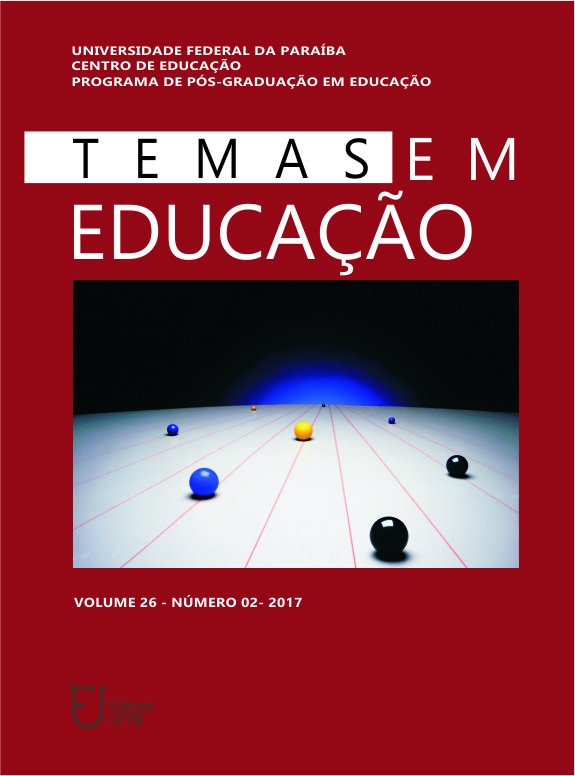INVENTABILITY, WEAVES AND THREADS: MINAS GERAIS WEAVERS' LEARNING
INVENTABILITY, WEAVES AND THREADS: MINAS GERAIS WEAVERS' LEARNING
DOI:
https://doi.org/10.22478/ufpb.2359-7003.2017v26n2.32990Keywords:
Feminist Studies, Popular Education, Pedagogies, Women workAbstract
This article is a fragment of the doctoral thesis defended in 2015, entitled as Threads, Weaves, Colors, Drafts and inventability: the learning of Resende Costa, MG weavers. The research's main goal was to analyse how the pedagogic process of hand weaving is done through mountains of Minas Gerais. There, most people make their lives out of hand weaving, and the city's economy comes from craft production. To analyze these pedagogic complexities, the Latin America's knowledge was utilized, based on Popular Education and Feminist Studies. The research methodology was based on participatory research and feminist methodology, done through semi-structured interviews, participatory observation, and field journal. The empiric research resulted in a wide material: 126 pages of interviews typed in single space, 248 photos, one notebook from participatory observation, plus 32 pages of drafts. Among the results found, it was noticed that the craft production process is composed of a series of techniques and knowledge. However, as this is a knowledge mostly popular and womanly, its complexities are almost lost through the lives of the weavers, replaced by the invisible. Furthermore, this study finds out how experience and sharing make the weavers' formation richer, a pedagogy created and developed by weavers over the years. That inventability keeps the weaving tradition alive, sharing what the experienced ones know with the ones they choose to learn the weaving techniques. It's necessary to look at the women experiences and learn with them, seeing those experiences as originators of the learning process they create and (re)create.
Downloads
References
BARTRA, Eli. Rumiando en torno a lo escrito sobre mujeres y arte popular. La ventana [online], Guadalajara, v. 3, n.28, p. 7-23, 2008.
BRANDÃO, Carlos Rodrigues. O que é educação. São Paulo: Brasiliense, 2000.
CASTRO, Amanda Motta. Fios, tramas, cores, repassos e inventabilidade: a formação de tecelãs em Resende Costa - MG. 2015. 230 f. Tese (Doutorado) – Programa de Pós-Graduação em Educação, Centro de Ciências Humanas. São Leopoldo: Universidade do Vale do Rio dos Sinos, 2015.
CASTRO, Amanda Motta; ALBERTON, M.; EGGERT, Edla. Nísia Floresta. A mulher que ousou desafiar sua época: Educação e Feminismo. POIÉSIS - Revista do Programa de Pós-Graduação em Educação (Unisul), v. 3, p. 46-55, 2010.
DUARTE, Cláudia Renata. A tecelagem manual no Triângulo Mineiro – história e cultura material. Uberlândia: EDUFU, 2009.
DUARTE, Rosália. Entrevistas em pesquisas qualitativas. Revista Educar, Curitiba, v. 24, n.24, 2004.
EGGERT, Edla. Educação popular e teologia das margens. São Leopoldo: Editora Sinodal, 2003.
FREIRE, Paulo. Pedagogia da autonomia: saberes necessários à prática educativa. 25. ed. São Paulo: Paz e Terra, 1991.
______. Pedagogia da esperança. Um reencontro com a Pedagogia do oprimido. São Paulo: Paz e Terra, 2003.
GEBARA, Ivone. As epistemologias teológicas e suas consequências. In: NEUENFELDT, Eliane; BERGSCH, Karen; PARLOW, Mara (Orgs.). Epistemologia, violência, sexualidade: olhares do II Congresso Latino-americano de Gênero e Religião. São Leopoldo: Sinodal, 2008.
KERGOAT, Prisca. Oficio. In: HIRATA, Helena; LABORIE, Franloise (Orgs.). Dicionário Crítico do Feminismo. São Paulo: Unesp, 2011.
LANZELOTTI, Gilberto. História da tecelagem artesanal no Brasil. Disponível em: <http://guiadecorar.com.br/posts/visualiza/1493>. Acesso em: 10 out. 2009.
MACEDO, Concessa Vaz de. A indústria têxtil, suas trabalhadoras e os censos da população de Minas Gerais do Século XIX: uma reavaliação. Varia História, Belo Horizonte, v. 22, n. 35, jan./jun. 2006.
______. A produção têxtil de fios e tecidos em Minas Gerais. Disponível em: <http://www.mao.org.br/fotos/pdf/biblioteca/macedo_01.pdf>. Acesso em: 20 de jan. 2012.
MAGNANI, José Guilherme C. Discurso e representação, ou de como os Baloma de Kiriwina podem reencarnar-se nas atuais pesquisas. In: CARDOSO, Ruth. A aventura antropológica: teoria e pesquisa. Rio de Janeiro: Paz e Terra, 1986.
MEDEIROS, Mitiko Kodaira. O segredo da trama: desvendando a comunicação na tecelagem popular brasileira. 2002. Dissertação (Mestrado) – Programa de Pós-Graduação em Comunicação, Faculdade de Comunicação. São Paulo: Universidade Paulista, 2002.
NEUENFELDT, Elaine G. Diálogo entre a leitura popular e a leitura feminista da Bíblia. Disponível em: <http://www3.est.edu.br/publicacoes/estudos_teologicos/vol4502_2005/et2005-2i_eneuenfeldt.pdf>. Acesso em: 22 out. 2012.
______. Práticas e experiências religiosas de mulheres no Antigo Testamento: considerações metodológicas. Disponível em: <http://www3.est.edu.br/publicacoes/estudos_teologicos/vol4601_2006/et2006-1f_eneuenfeldt.pdf>. Acesso em: 22 out. de 2012.
NEUENFELDT, Eliane; BERGSCH, Karen; PARLOW, Mara (Orgs.). Epistemologia, violência e sexualidade: olhares do II Congresso Latino-americano de Gênero e Religião. São Leopoldo: Sinodal, 2008.
PERROT, Michelle. Minha história sobre as mulheres. São Paulo: Contexto, 2007.
PEZZOLO. Dinah Bueno. Tecidos: História, tramas, tipos e usos. São Paulo: Editora SENAC, 2008.
SANTOS, Boaventura de Souza. Toward a new common sense: law, science and politics in the paradigmatic transition. Nova Iorque: Routledge, 1995.
SANTOS, Boaventura de Souza; MENESES, Maria Paula. Epistemologias do Sul. Coimbra: CES, 2009.
SILVA, Tisa Devincenzi. O artesanato e o turismo no Rio Grande do Sul. Disponível em: <http://amigonerd.net/trabalho/24735-o-artesanato-e-o-turismo>. Acesso em: 18 jun. 2012.
STRECK, Danilo. Entre emancipação e regulação: (des) encontros entre educação popular e movimentos sociais. Revista Brasileira de Educação, Rio de Janeiro, v. 15, n. 44, maio/ago. 2010.
SENNETT, Richard. O artífice. Rio de Janeiro: Record, 2009.
Downloads
Published
How to Cite
Issue
Section
License
Authors who publish in this journal agree to the following terms:
. Authors retain the copyright and grant the journal the right to first publication, with the work simultaneously licensed under the Licença Creative Commons Attribution that allows the sharing of the work with acknowledgment of authorship and initial publication in this magazine. . Authors are authorized to assume additional contracts separately, for non-exclusive distribution of the version of the work published in this journal (eg, publishing in institutional repository or as a book chapter), with acknowledgment of authorship and initial publication in this journal.
. Authors are permitted and encouraged to publish and distribute their work online (eg in institutional repositories or on their personal page) at any point before or during the editorial process, as this can generate productive changes, as well as increase impact and citation of the published work (See O Efeito do Acesso Livre).



















